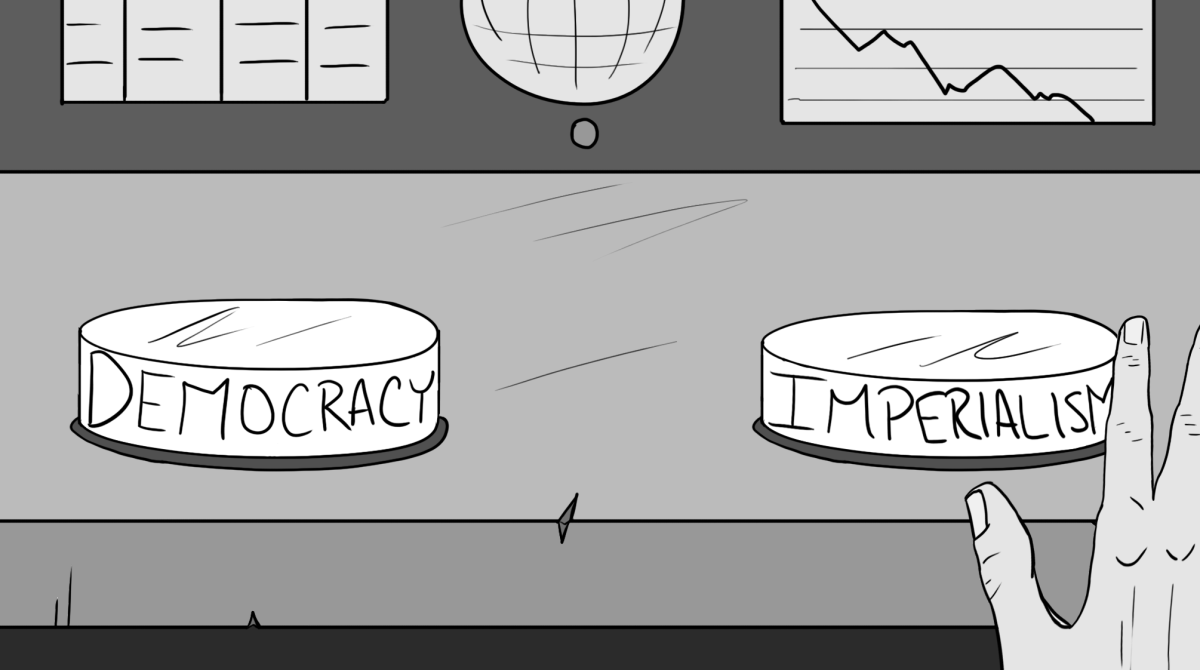In a previous version of this article the name of Lawrence Lessig’s book was incorrect, The Mercury regrets this error.
America’s imperialist ambitions are known to be heading toward the status of empire, and together with our declining leadership in science, technology and education, the American people have become prone to accepting authoritarian practices.
The United States is a dominant international power, and has gained this status over two centuries by dispersing ideological propaganda, such as the American Dream, by intervening into other nations’ affairs economically and militaristically to open its industries and resources to the world economy and by nation building through the World Bank. Such actions, among others, begin to illustrate what is called American Imperialism.
Around the world, America has over 700 military bases in over 180 countries that serve as hegemonic platforms to maintain its dominance. This expansion makes America appear as an empire. However, historian Paul W. Schroeder explains the difference between empire and hegemony in his 2010 article, “Is the U.S. an Empire?” He concludes that America is not an empire yet, but our ambitions and goals are leading us there.
Historian Chalmers Johnson said in his book Nemesis: The Last Days of the American Republic that building an American empire “will inevitably undercut our domestic democracy and … the combination of huge standing armies, almost continuous wars … and ruinous military expenses have destroyed our republican structure in favor of an imperial presidency.”
On these bases, Johnson argues American imperialism is paving a path to empire, and that democracy and empire are mutually exclusive.
America’s imperial tendencies appear to be manufactured by groups with imperialist interests that systematically manipulate our governmental institutions. Such exploitations are part of a broader problem detailed by Lawrence Lessig in his book Republic, Lost in which a “dependence corruption” enables any official to become reliant on special interests.
Now, even though the United States leads the world in top scientific output, according to the National Science Foundation, this is changing as new challengers in Asia rise. The NSF reports that United States is by far the largest investor in R&D, however the United States has experienced substantial declines in the last decade in its share of global R&D.
Several other economies outperform the United States’ in terms of R&D intensity — that is, other countries have a higher ratio of R&D expenditures to GDP and their R&D intensities are typically growing faster than ours.
America’s education system, a major avenue for learning science, is fledgling compared to other democratized nations. The United States spends more on education per student than most other nations, especially on noninstructional items, and yet our students score poorly on comparative exams.
Causation is difficult to prove, but there is a correlation between the increase of American imperialism and the decrease of American scientific and educational prowess.
Just like how I can be musically literate without being able to play an instrument, for the American public to be scientifically literate in any meaningful sense they need to understand basic science and be aware of advanced topics. In this sense, large swaths of the American adult population are scientifically uneducated to an unacceptable degree, because most hardly understand the basics and almost all are not aware of the advanced topics.
Given America’s science illiteracy and imperial state, special interests in government, which arbitrate what science and technology is worth funding, are likely to represent imperial interests which will use the ignorant officials to centralize government power into their hands and restrict liberties of their opponents. Our uninformed public is therefore prone to authoritarianism.
Authoritarian governments generally rise when an unchecked, strong centralized power limits political freedoms. America’s government is increasingly centralized by a growing bureaucracy, which lays atop a giant web of contractors — even with separation of powers and different levels of authority political power is being concentrated.
Political and community involvement is how we can prevent an American empire and improve our education system. For instance, demand your officials to reduce America’s global military presence through principles of noninterventionism and well-funded science.
It is vital to do everything possible to help yourself and those around you to be scientifically literate. Nevertheless, simply explaining facts is not usually an effective way to persuade people of a different viewpoint. As Tim Requarth at Slate explains, people need to understand the emotional aspects of science and why those facts matter to their communities.
Ultimately, the combination of these problems if left unresolved will destroy our democratic republic and usher an authoritarian state in the land of the free.






